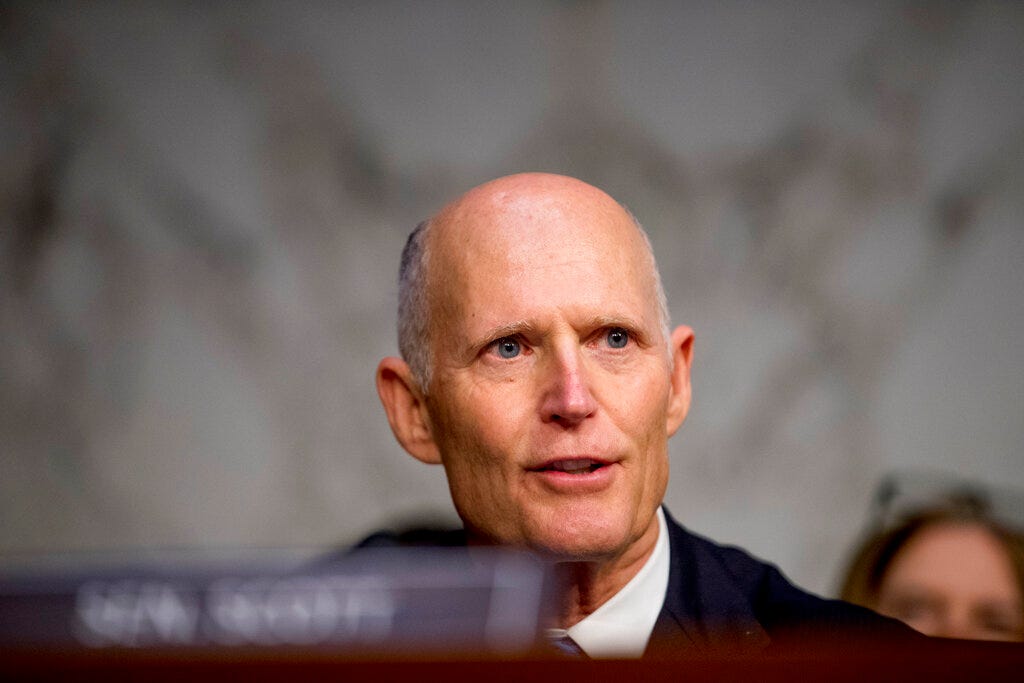
AP Photo/Andrew Harnik, File
- Sen. Rick Scott says that GOP candidates would be "foolish" to dismiss Trump's endorsement.
- As the party ramps up its messaging headed into 2022, they hope to excite the conservative base.
- Trump has already gotten involved in several 2022 races as he floats his own 2024 presidential bid.
Sen. Rick Scott on Sunday said that it would be "foolish" for Republican candidates to not wholly accept an endorsement from former President Donald Trump as they head into the 2022 midterm elections.
During an appearance on NBC's "Meet the Press," the Florida Republican, who chairs the National Republican Senatorial Committee, said that the former president's seal of approval is something that candidates should embrace, but reiterated that an endorsement would not automatically translate into an electoral victory.
"I think you'd be foolish not to want and accept Donald Trump's endorsement, but you're going to win not because somebody endorses you," he said. "You're going to win because you focus on making sure inflation gets stopped. Making sure people get a job. Making sure their kid, your kids, aren't indoctrinated on critical race theory. Making sure we have safe communities. That's gonna be the issues that people care about."
Republicans, fresh off of a big victory in Virginia, with Gov.-elect Glenn Youngkin defeating former Democratic Gov. Terry McAuliffe, and a closer-than-expected victory by Democratic Gov. Phil Murphy of New Jersey, have sought to use the momentum from those races to boost the conservative base as the party aims to regain control of Congress next year.
The GOP intends to craft a larger education message that they feel will appeal to suburban parents, an attempt to replicate the success that Youngkin had in peeling off independent voters in many suburban localities across Virginia.
For months, Youngkin and Republicans across the country - including Scott during his NBC interview - have systematically targeted critical race theory when discussing education issues, despite the discipline not being a part of the curriculum in virtually any K-12 setting.
Critical race theorists have examined how America's history of racism continues to reverberate through laws and policies that exist today. This issue has become a cultural flashpoint among conservatives in the larger debate over education.
At the helm of the National Republican Senatorial Committee, Scott will play a key role in developing the party's campaign strategy for 2022.
While Youngkin was able to successfully employ a campaign model that worked for Virginia, a blue-trending state that before last week had previously not elected a Republican on the statewide level since 2009, it may become tougher to maintain such a balance going forward.
Youngkin accepted Trump's endorsement, but the former president did not campaign for him in Virginia, where he remains unpopular.
However, since leaving office, Trump has continued to hold rallies and has already gotten involved in 2022 races, which may complicate the situation for candidates who need to keep him at arm's length to avoid a nationalization of races, especially as he continues to flirt with a 2024 presidential campaign.
Scott, for his part, said that he hopes that Democrats focus on the former president in next year's races.
"I hope Democrats continue to be obsessed with Donald Trump," he said. "I think Terry McAuliffe would probably run his campaign differently, he wouldn't focus his whole campaign on Donald Trump."
GOP Gov. Larry Hogan of Maryland, a Trump critic, said during a Sunday appearance on CNN's "State of the Union" that while Youngkin was able to win over loyalists of the former president as well as many swing voters, he was concerned about the former president's involvement in future races.
"I'm concerned about it," Hogan said. "It's obviously an issue to contend with. And if the former president interferes with primaries and tries to help nominate folks that are unelectable in a general election in, say, swing districts and purple states, that's going to hurt."